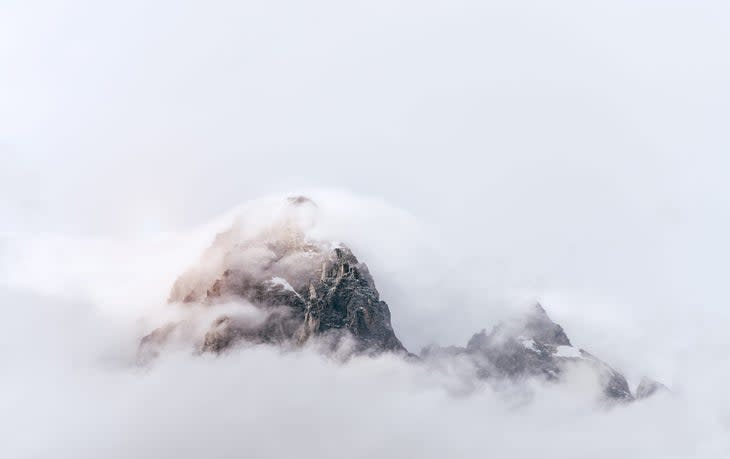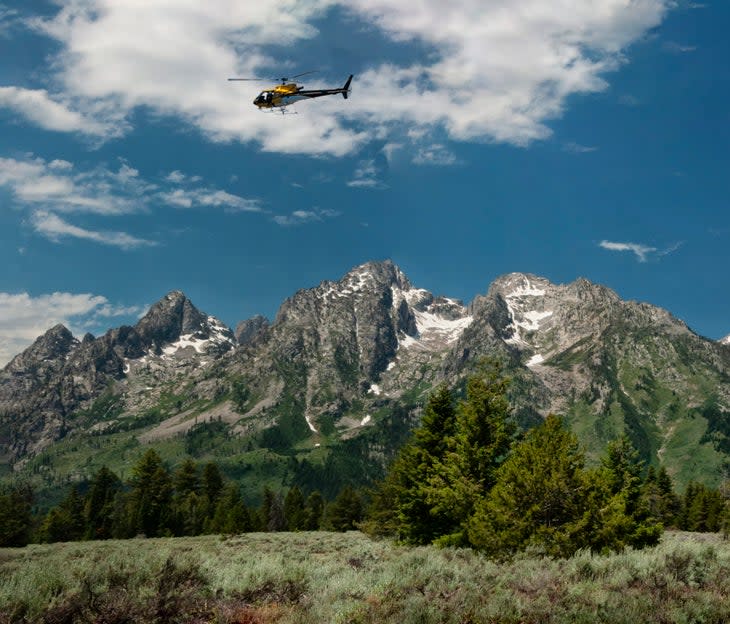Trapped 50 Feet Under the Snow
This article originally appeared on Backpacker
Dan Wenker knew he was going too fast. He was on the eastern flank of the Grand Teton, glissading down a snowfield at the end of a long day. The snow was slick, and the slope was steeper than it looked. As Wenker picked up speed, he thought about the ice ax strapped to his pack and wished it were in his hand. He tried to plunge his heels and hiking poles deeper into the slope to slow his momentum, but it was too late to hit the brakes. He was already sliding out of control--and hurtling toward the rocks below with deathly speed.
Wenker's climbing partner, Jim Zingerman, was at the base of the slope when he saw his friend rocketing toward him. He waved, shouting a warning, but Wenker couldn't hear. He was too busy fighting to brake as the boulders beneath him lurched into sharp relief.
At least I'll stop, Wenker thought grimly. But, man, is it going to hurt. It wasn't until the last second that he realized there was something else just beyond the rocks: a yawning, crevasse-like moat in the ice.
Wenker coiled his legs beneath him, preparing a last-ditch effort to leap over the gaping hole. Instead, his momentum launched him forward--and he felt his body slam into the far edge of the moat so hard it knocked the wind out of him. Before he knew it, he was falling. Wenker cried out.
Then, suddenly, there was nothing but silence. Zingerman stood alone on the slope. He stared at the dark chasm, and he felt his heart drop. He's gone, Zingerman thought in shock. I just watched my friend die.
High winds on the Grand
Wenker and Zingerman first met more than a decade ago when they both lived in Yakima, Washington. (Zingerman is still based there; Wenker has since relocated to Atlanta.) The two were part of a local climbing club. They hit it off right away. Zingerman, a doctor of family medicine in nearby Selah, appreciated Wenker's energy and enthusiasm, and Wenker admired Zingerman's steady, grounded approach. They worked well together. Over the years, the two summited dozens of peaks in Washington and California, as well as Tanzania's Mt. Kilimanjaro. By the time they started concocting a plan to climb the Grand Teton, the two had become close friends.
On this particular adventure, the pair were joined by two other friends: Mark and Nicholas McGuire, both of whom had extensive technical climbing experience. The group planned to do the Owen Spalding Route, the mountain's most popular trade route.
On June 28, 2022, the foursome hiked up to the Grand Teton's Lower Saddle and set up camp. The skies were clear, and they were in high spirits. But sometime overnight, the weather turned. The wind picked up until it was blowing at a sustained 40 mph. They waited an additional day at the saddle, hoping the winds would calm. Around 4:00 a.m. on the 30th, the group decided that the McGuires--the more experienced pair--would continue on to the summit alone. If conditions improved, they'd radio down for Wenker and Zingerman to join them.
So, the two waited, chatting as the sun rose. They talked about getting older. They'd done a lot of hiking together, Zingerman said, but the Grand Teton was a technical, multi-day climb.
"I don't know," he mused. "Maybe this is it. We're getting too old for this." It seemed wise to get out while they were still ahead, Zingerman said. They could enjoy this last adventure, and then dial things back before anything bad happened. Wenker listened to the wind screaming outside their tent. Maybe his friend was right.

The descent
Hours passed and still the weather didn't improve. So, around 11:00 a.m., Wenker and Zingerman decided to strike camp. They packed up their gear, including a spare rope, and started the long descent back to the Garnet Canyon trailhead.
At the top of the first snowfield, the two paused to unpack crampons and ice axes to down-climb the slope. A park ranger named Noah stopped alongside them.
"Are you planning to glissade?" the ranger asked. "If you do, be sure to control your speed."
It was all Wenker could do not to roll his eyes. They planned to glissade later, but they didn't need advice. He reassured the man that they'd been mountaineering a long time; they knew what they were doing. The ranger bid them good luck and walked away.
Wenker and Zingerman descended that first snowfield, the steepest of the day, without incident. By the time they got to the second snowfield, a zone called the Miller Slabs, they were sure they were out of danger. This time, they didn't take out their crampons or axes. Instead, they slid out onto the snow in bare boots, hoping to boot-ski down.
Almost immediately, Wenker could tell the snow was slicker than he'd bargained for. Partway down the slope, he managed to stop himself long enough to take a breather. Still, he wasn't worried yet. The sky was blue and the weather had calmed. He and Jim had been laughing and joking the whole way down. It was hard not to feel good.
But then, during the final pitch of the glissade, Wenker realized he'd picked up speed again. And this time, it was impossible to slow down.
Pinned in the darkness
Wenker shouted as he felt his body hurtle through the air, clear the lip of the moat, and crash leg-first into the far side. He felt his body ricochet backward, pinballing down nearly 25 feet into the rift, which had melted out from heat from adjacent rocks. At one point he smacked his head--whether on ice or rock, he didn't know--and lost consciousness. When he came to, he realized he was standing upright on a narrow ice shelf within the moat. It was dark.
Wenker reached out in front of him and felt a sheer rock wall. Behind him was a wall of ice. He was pinned.
Both walls were slick from a glacial waterfall that poured into the crack beside him. Within seconds, he was soaked. His leg and hip ached--later he'd find out the leg was broken. Wenker fought the urge to panic. He forced himself to breathe.
Then, he heard a voice--perhaps from within him, perhaps from somewhere else. It was calm and even, and its message was simple: "This is not your day to die."
Jim's still out there, Wenker realized.
Up on the surface, Zingerman was standing at the lip of the moat, struggling to come to terms with his friend's death, when he heard Wenker shout his name. For a moment, Zingerman felt a surge of relief--but it didn't last long.
A doctor by trade, Zingerman knew that Wenker was soaked and freezing and likely had serious injuries. In all likelihood, it would be impossible to get him out before he succumbed to hypothermia. Zingerman wasn't just going to watch his friend disappear--he was going to hear him slowly freeze to death, out of reach, at the bottom of a hole.
Ice fishing
This time, it was Zingerman's turn to fight panic. He pulled out his phone to call 911, but he was out of reception. He yelled for help, but there was no one around. So, Zingerman did the only other thing he could think to do: He tipped his face to the sky and yelled: "God, I need you!"
At that moment, Zingerman remembered he had agreed to carry the rope--something he almost never did. He hastily began uncoiling it, casting the rope into the hole. But the moat wasn't a straight-sided crack. It twisted and curved--which meant Zingerman couldn't see Wenker, and he couldn't get the rope to feed straight down. It kept getting caught on ledges in the rock. He pulled it up and cast it down over and over again.
As he struggled, Zingerman could hear Wenker calling his name. He knew his friend didn't have much time.
Some 50 feet below, Wenker had begun to shiver violently. His hands were so cold they hurt. He'd been down in the dark for about 25 minutes now, terrified that the icy ledge beneath him was going to give way at any moment. He couldn't see the bottom of the moat. The hole seemed to go on forever. If he slipped further, he'd be a goner.
Wenker thought about his family. His daughter had just gotten married--he'd walked her down the aisle just a few days prior. Wenker had dropped off his wife at the airport after the wedding. There, he'd said that if anything bad happened to him on this climb, she was to wait before calling their daughter.
"If I'm dead, I'm dead," he'd told her. "Don't ruin their honeymoon on account of me."
Why did I say that? He thought now. He was always safe. He never said such things to his wife. But now, he thought grimly, the warning might just turn out to be prophetic.

A tap on the shoulder
After 25 minutes of waiting, Wenker felt something touch his shoulder. He looked up--and could have cried from joy. It was the end of a rope. He quickly tied it around his waist and felt the rope come taught. Slowly, carefully, he began to climb, picking his way up the slick rock wall in front of him and doing his best to ignore the pain in his leg. The rope cinched tight under his armpits. Zingerman was hauling in the slack.
After about 25 feet of climbing, Wenker's head emerged into the light. He blinked--and saw Zingerman braced against the rocks at the edge of the moat, pulling the rope hand-over-hand. For a moment, they stared at each other. Wenker was drenched in icy water and white as a sheet.
"Dan," Zingerman said, "I am so glad to see your face."
Wenker rested briefly, then climbed the remaining 20 to 25 feet. When he pulled up and over the final ledge, Zingerman seized his friend in a hug. The two of them lay there, laughing and crying, unable to believe that Wenker was alive.
After a few more minutes, Noah, the park ranger, turned a corner and spotted them. He'd heard a blast from Zingerman's safety whistle. Noah ran over and evaluated Wenker's injuries. Together, they sat on the rocks and waited for the helicopter.
"Now is when we get the speech about glissading safety, huh?" Wenker joked. But Noah just shook his head.
Over the past few years, three other Teton hikers had fallen into similar moats, which often form at the edges of snow fields. The other hikers had fallen in much like Wenker had. All three had died.
"No, there's no judgment here," Noah said. "I'm just glad you're alive."
For exclusive access to all of our fitness, gear, adventure, and travel stories, plus discounts on trips, events, and gear, sign up for Outside+ today.

